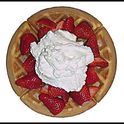Is lactic acid (used in soy sauce) from cows?
Also, what is it? I'm vegan so I want to know if it's ok for me to eat
15 Comments
usuba D.August 25, 2012
Yes, since I am 99.99% sure the source of lactic acid is corn
usuba D.August 25, 2012
Then the lactic acid is an added ingredient, hence it being on the label. I would then venture to say that this is a non-fermented soy sauce, lactic acid added to simulate the taste of a fermented soy sauce.
usuba D.August 24, 2012
A question goes back to @alexia1996 . . . is the soy sauce you are referring to in your question have lactic acid in the ingredient listing? If so, I would feel 99% sure that it is corn derived (commercially created by fermenting sugars from corn). ADM (Acrcher Daniel Midland) is the largest manufacture of lactic acid for food use in the USA, possibly worldwide. In Europe, most of the commercially available lactic acid is derived from beet sugar, because of the anti-GMO sediment and corn is not as large an ag crop as beets. Yes, the ADM derived lactic acid will have come from GMO corn.
ChefOnoAugust 24, 2012
Lactic acid can indeed be produced by bacteria other than lacto-, just as the acid doesn't require lactose to be the source. I was merely attempting to point out the natural relationship between the two, not ruffle any feathers, sorry.
As for the question, it asks about lactic acid "used in soy sauce". I assumed it was an ingredient in, let's call it "industrial" sauces (as opposed to fermented products). A quick read from On Food and Cooking, I see that lactic acid is purposefully created by means of introducing lactic bacteria during fermentation.
Does that mean the acid doesn't come from cows? Maybe. Do shoyu breweries add lactose? (Beer breweries sometimes do.) Did the bacteria originate from cows? (Likely at some point.) Do vegans have issues with bacteria? Is the product filtered using gelatin, isinglass or some other animal product?
usuba D.August 24, 2012
There is no reason to list lactic acid as an ingredient, since it is formed during the fermentation process. Note that real sauerkraut, cheese, yougart, salame (only that a lactic acid starter culture is used) or any other fermented product do not list lactic acid as an ingredient. I could go on listing many other foods where a chemical reaction is created during processing and the by-product of that reaction is not listed. Fermentation is a organic (meaning living in this case, not certified Organic) chemical reaction . . . as is dough that rises with the reaction of yeast. CO2 is formed in trapped in the bread, but not listed on the ingredients panel.
susan G.August 24, 2012
Traditionally fermented soy sauce came out of ancient China and Japan, over 500 years ago. There were no dairy animals (well, Mongolia, but don't go there), thus no dairy in the sauce. Soybeans, water, wheat, salt are the ingredients listed on the most traditional bottle in my pantry, Ohsawa Nama Shoyu. I would guess that lactic acid listed in the ingredients indicates a shortcut taken by the producer, who uses a chemical to replace a long fermentation time.
If you're not comfortable with this question, your best bet to avoid any question is to use Bragg's or a similar non-fermented sauce. It is different, and can't have the nuanced taste that develops during a (traditional) 12 to 18 month koji fermentation. (information with help of The Book of Tofu, Shurtleff & Aoyagi)
If you're not comfortable with this question, your best bet to avoid any question is to use Bragg's or a similar non-fermented sauce. It is different, and can't have the nuanced taste that develops during a (traditional) 12 to 18 month koji fermentation. (information with help of The Book of Tofu, Shurtleff & Aoyagi)
ChefOnoAugust 24, 2012
For what it's worth, McGee states that non-fermented soy sauces are often blended with traditionally-produced shoyu to disguise the obvious differences.
usuba D.August 24, 2012
I never said that. Most soy sauce or shoyu on the market that I am familiar with is made from soy beans, wheat, water and salt that is fermented. There is no animal derived ingredients that I know of in the product, including the bacteria culture used to create the fermentation. If you have a health issue with wheat, than try tamari, which is wheat free soy sauce.
usuba D.August 24, 2012
@ChefOno - All due respect, I am in the fermentation business, your explanation is a bit of a stretch. Lactic acid can be formed by "bugs" that have no relationship to lactobacillus. Look at the strep bugs used to produce salami. When you go out and exercise, your body produces lactic acid . . .produce too much and you get cramps. And yes, soy sauce has lactic acid . . at least the good quality ones that are fermented.
ChefOnoAugust 24, 2012
For accuracy: Lactic acid and lactose are very much related. "Lacto" = milk, "lactose" = milk sugar, "lactococcus" = milk + sphere, "lactobacillus" = milk + rod (the two bacteria that convert lactose to lactic acid). Lactic acid does not necessarily have to be derived from lactose, it can be produced from other sugars or synthesized. Beyond that, I'm not getting involved.
There's lactic acid in soy sauce?
usuba D.August 24, 2012
No. Lactic acid is the by product from fermenting a sugar with a bacteria. Such as fermenting meat to create salami, or making yougurt, cheese, sauerkraut . . .just to name a few foods that ferment. Lactic acid is not related to lactose, the natural sugar of milk. They just sound the same.
Showing 15 out of 15 Comments
Recommended by Food52
Popular on Food52
Continue After Advertisement



